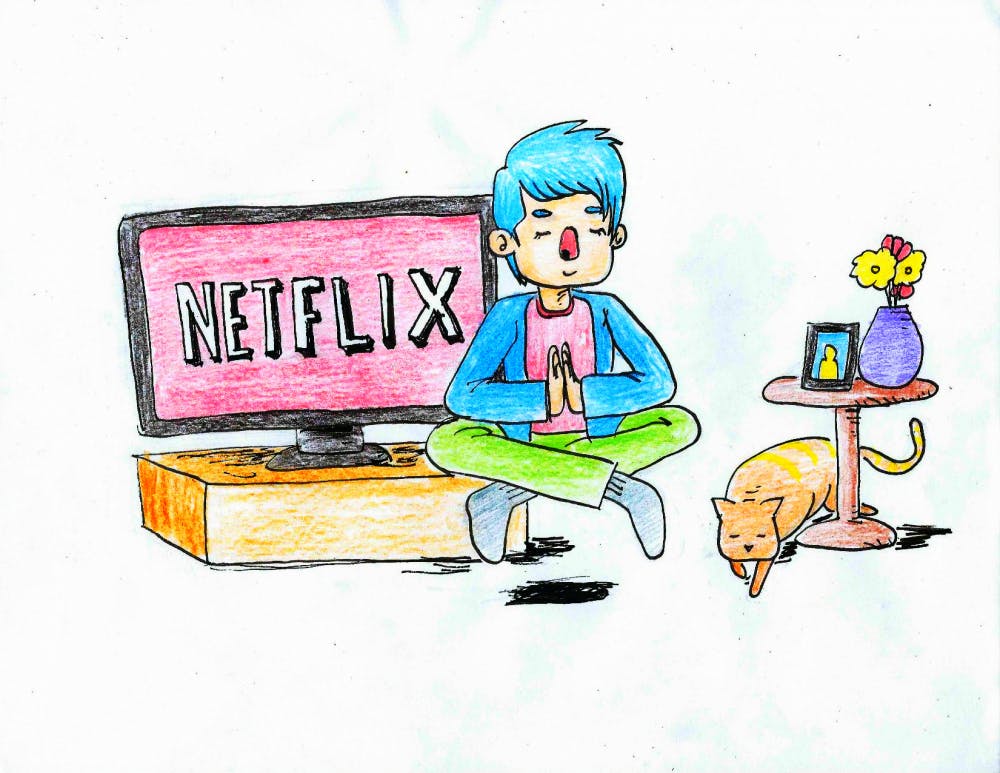As a college student with just one week left in the semester, there are two things going on in my life: a frantic push to get everything submitted and the constant sound of Netflix in the background.
With four papers due by the end of the week, a presentation that I have not touched at all and a final on Monday, common sense should kick in and tell me that these two things should not co-exist.
Instead I came to a strange and beautiful realization that has forever changed the way I look at the world: Netflix is the key to inner peace.
You might assume that this was some bizarre thought I was having at 2 a.m. after realizing the paper I was writing was actually due next week. But you would only be half right, because as I’ve done more research into this, I have found that binge watching is truly our generation’s version of meditation.
While we may think that meditation can only happen in dimly lit areas with complete silence, that's not always true.
“If you get in touch with your breath and connect inward, you access peace anywhere,” Julie Lemerond, general manager at A Mindfulness Life Center, said.
So obviously, peace can even be accessed on your couch with Netflix in the background.
There are literally thousands of different books and essays about meditation. For example, you can read " The New Meditation Handbook" or even Meditation for Dummies. But for the purposes of my arguments, I will be referencing Eoin Finn's article for Chatelaine, which outlines four basic principles of meditation.
According to the article, the first principle of meditation is that a "relaxed body is a relaxed mind."
At no other time is the body more relaxed than when a person is six episodes deep into some series. The body simply sinks into whatever couch, bed or chair you choose. All the aches and pains of the world and body seem to fade away, replaced by a clear sense of relaxation.
The next is "the brain hammock." This is basically the idea that the brain is constantly at work and that meditation relaxes the mind. This then helps declutter your thoughts and focus more clearly. Now, every millennial has heard that TV is rotting our minds and turning us into zombies.
But this thinking clearly misses the point — Netflix certainly does clear our minds. There is no denying that. But this does not lead to mindlessness, instead it leads to clearer, more enlightened mindfulness.
The third principle is perhaps the hardest to grasp, the idea behind finding your breath. This idea is a cross between the brain hammock and the relaxed mind. As both the mind and body relaxes, you should begin to look for satisfaction in the little things like long breath.
While Netflix does not necessarily help you find your breath, I think that it helps everyone catch their breath. The world is a busy place, and we often forget to take a moment to breathe. Netflix allows us to tune out the worries of the world and finally exhale.
The final principle is to "open the heart." This principle is related to the idea that there is an interconnectedness to the world and that meditation helps you feel that. Stories are one of the first ways that we learn about the world. They help us understand and empathize with other people. They help us feel like we are not alone in the world.
As the stories have evolved, so have the ways we receive them. Netflix has recently reached 100 million subscribers, which means that 100 million people are all plugged and exposed to the same ideas. Thus, Netflix is truly helping us reach a level of interconnectedness unlike ever before.
On the surface, Netflix may seem like just the latest form of procrastination, but in actuality it offers so much more. It helps us connect with others, relax and find inner peace.
With that in mind, I am going to continue
Reach the columnist at agrafil@asu.edu or follow @alecgrafil on Twitter.
Editor’s note: The opinions presented in this column are the author’s and do not imply any endorsement from The State Press or its editors.
Want to join the conversation? Send an email to opiniondesk.statepress@gmail.com. Keep letters under 500 words and be sure to include your university affiliation. Anonymity will not be granted.
Like The State Press on Facebook and follow @statepress on Twitter.




